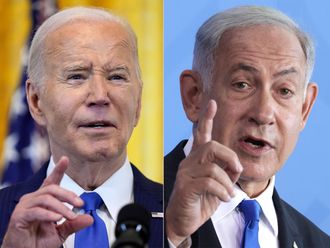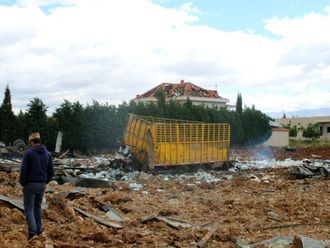Occupied Jerusalem: Revealing a huge archive of stolen Iranian nuclear plans, Prime Minister Benjamin Netanyahu of Israel accused Iran on Monday of lying for years about its efforts to build a nuclear weapon.
Days before President Donald Trump was to decide whether to pull out of the 2015 nuclear deal with Iran, Netanyahu presented records from a secret warehouse in Tehran, making the case that Iranian leaders had deceived the international nuclear agency when they insisted their nuclear programme was for peaceful purposes. Israeli regime spies seized the documents in an overnight raid in January, a senior Israeli official said.
But Netanyahu did not provide any evidence that Iran had violated the nuclear agreement since it took effect in early 2016. That suggests that the Israeli prime minister — who has opposed the deal since its inception, and even went to the US Congress to try to block it — was hoping that the disclosures would bolster Trump’s resolve to scuttle the agreement on May 12.
Doing so could be one of the most momentous foreign policy decisions of Trump’s time in office. In recent days, a succession of European leaders, including President Emmanuel Macron of France and Chancellor Angela Merkel of Germany, have come to the White House to make the case that the United States was more secure with the Iran deal than without it. Netanyahu’s presentation seemed intended to push the president in the other direction.
Trump was coy about his plans. Speaking at a Rose Garden news conference minutes after Netanyahu’s presentation, he gave no indication of whether he would scrap the deal or continue his effort to force the European partners who helped negotiate it — Britain, France and Germany — to try to reopen it.
Iran’s deputy foreign minister, Abbas Araghchi, a top Iranian negotiator of the nuclear agreement, called Netanyahu’s remarks “a very childish and even a ridiculous play.”
In a telephone interview with state-run television, he said Netanyahu’s presentation was “a prearranged show with the aim of impacting Trump’s decision, or perhaps it is a coordinated plan by him and Trump in order to destroy the JCPOA,” the initials of the nuclear agreement, the Joint Comprehensive Plan of Action.
“These files conclusively prove that Iran is brazenly lying when it said it never had a nuclear weapons program,” Netanyahu said, pointing to copies of what he said were 55,000 printed pages and 183 compact discs.
The senior Israeli official said the regime’s Mossad intelligence service discovered the location of the archive in February 2016, and had the building under surveillance since then. Mossad operatives broke into the building one night in January, removed the original documents and smuggled them back to Israel the same night, the official said.
Trump was informed of the operation by the Mossad chief, Yossi Cohen, on a visit to Washington in January, the official said. The official attributed the delay in making the material public to the time it took to sift through and analyse the documents, the vast majority of which were in Farsi.
But the Iranian program to design and build nuclear weapons was hardly a secret; its existence was the reason the United States, under President George W. Bush and then President Barack Obama, moved to block it. Both presidents said publicly that Iran had a bomb project underway, and the United States mounted, with Israel, a vast covert program to undermine the Iranian effort with one of the world’s most sophisticated cyberattacks.
US intelligence agencies concluded in 2007 that Iran suspended the active portion of the bomb effort after the beginning of the Iraq War, in 2003, and Netanyahu confirmed that in his presentation. But he said other elements of what Iran had called “Project Amad” went ahead, directed by Mohsen Fakhrizadeh, an Iranian scientist.
The documents he showed were not the first to leak out of the Iranian archives, or to document Fakhrizadeh’s role.
Netanyahu brandished what he described as Iranian plans to build up to five nuclear weapons.
But he cited no evidence that those plans were pursued.
Iranian diplomats greeted Netanyahu’s accusation with derision.
“Ha, ha, ha,” said Mohammad Marandi, a University of Tehran professor who is close to Iran’s leaders and participated in the nuclear talks in Vienna. “It’s very convenient to bring this up two weeks before the decision on the nuclear deal is made,” Marandi said. “No one in their right mind will take this seriously, unless there is a prearranged deal with the White House.”











